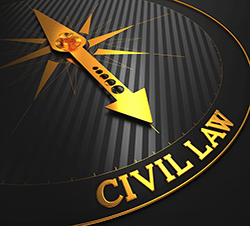Collin County Civil Court Records Search
Collin County, Texas, has a well-oiled judicial system that addresses a wide range of civil matters. Each of the various civil courthouses has its jurisdiction and specific types of cases it handles. Knowing which court to approach to either file a case or retrieve court records can save time and effort in tracking down the resources you need. We'll cover what courts handle the various types of civil cases, how to retrieve civil case records, and what privacy restrictions are in place that limit access to certain records.
The Various Civil Courts of Collin County Texas
Each of the various civil courthouses in the county are tasked with managing specific civil cases, from small claims and family disputes, to large class action law suits. Here is a breakdown of how the civil divisions are structured.
District Civil Courts: The District Civil Division manages the large majority the most serious civil cases. District courts are the main trial courts with the largest jurisdiction over civil cases. These include:
1). Family Law Matters: This encompasses divorce, child custody, and child support cases.
2). Civil Lawsuits: Cases involving significant financial disputes, property issues, and serious personal injury claims.
3). Probate Matters: While primarily handled in probate courts, complex estate cases may appear in district courts.
2). Civil County Courts at Law: The Civil Courts at Law handle less severe civil cases compared to District Division. These courts offer a more accessible venue for less complex civil matters. These include:
1). Misdemeanor Cases: While misdemeanors are criminal, any civil components, such as fines, may be addressed here.
2). Small Claims: Disputes involving smaller monetary amounts.
3). Probate Matters: Simple probate cases can be handled here.
3). Justice of the Peace Civil Courts (JP): For common everyday civil disputes, JP Civil Courts are often the first stop. These courts are designed to provide swift resolutions to minor civil disputes, that often only take a day of the court's time. They primarily deal with:
1). Small Claims: Cases involving amounts less than $10,000.
2). Eviction Cases: Landlord-tenant disputes, often involving evictions.
3). Debt Collection: Simplified procedures for creditors to collect debts.
4). Probate Courts: The Probate Division is a specialty court that specifically handles matters related to estates and guardianships. These typically include:
1). Estate Matters: Administration of wills and estates of deceased persons.
2). Guardianship Cases: Legal processes to appoint guardians for minors or incapacitated adults.
Running a Civil Court Record Search in Collin County
Accessing civil court records in Collin County can be done through a few different channels. Through the County Clerk's web portal, in-person requests, and through third-party providers. Here's how you can run a civil court record search:
Online Access: The county offers online access to court records through its official website. Here's a step-by-step way to access them:
1). Visit the Collin County Clerk's Website: The county clerk maintains records for all the courts. Navigate to their official site.
2). Use the Online Search Tool: Look for a section dedicated to public records or court records.
3). Enter Search Criteria: You'll typically need the case number, party names, or other identifiers.
4). Review Results: Once you submit your search, you'll be presented with available records that match your criteria.
In-Person Search: If online access is not sufficient, or you prefer the legacy method of looking up civil court records, you can visit the courthouse for an in-person search:
1). Go to the Collin County Courthouse: Make sure to check the courthouse hours before your visit.
2). Request Assistance: Upon arrival, you can request help from the clerk's office to access records.
3). Provide Necessary Information: Be prepared to provide detailed information about the case you're searching for.
Third-Party Services: Several third-party websites offer access to public records for a fee, civil records fall under this category. These can be useful if you're looking for a comprehensive search or need assistance navigating the system. Another benefit of third party services is you can get a more comprehensive overview of a person's court case history.
Understanding Civil Case Types
Civil cases in Collin County can vary widely. Here’s a closer look at the types of civil cases you might come across:
Family Law Cases: These are among the most common civil cases, however many of these records are not publicly accessible, especially those with juveniles and minors. These typically include:
1). Divorce: Legal dissolution of a marriage, involving property division and spousal support.
2). Child Custody: Determining the legal and physical custody of children.
3). Adoption: Legal process to adopt a child, transferring parental rights to the adoptive parents.
Personal Injury Cases: Involving claims for damages due to injuries caused by accident or negligence, these cases often seek compensation for medical bills, lost wages, and pain and suffering.
Contract Disputes: These cases arise when one party alleges breach of contract by another. They often involve financial restitution or specific performance.
Property Disputes: Involving disagreements over property ownership or boundaries, these cases can be complex, especially when substantial assets are involved.
Probate and Estate Cases: These cases involve the distribution of a deceased person's estate and can include will contests, estate administration, and disputes over guardianships.
How Do I Run a Collin County Civil Court Case Search?
To access civil court records from any Texas county you can either use the state or county's judicial website, contact the clerk of courts, or use third party public record websites. You will need to know either the complete and correct spelling of the person's name, or the specific civil case number.


